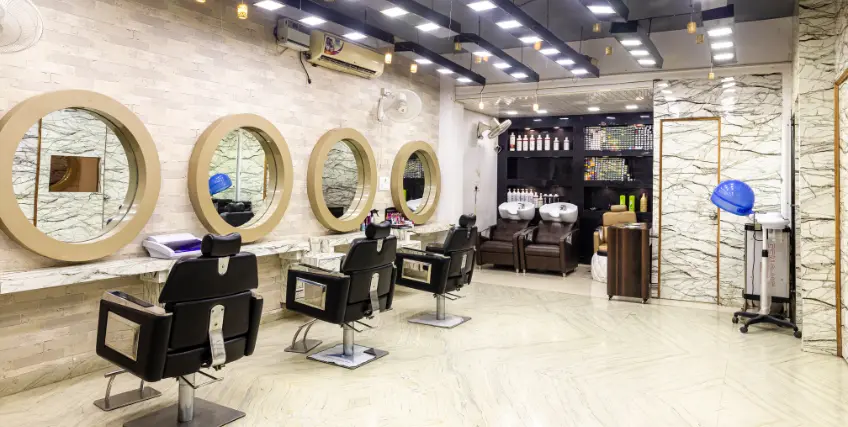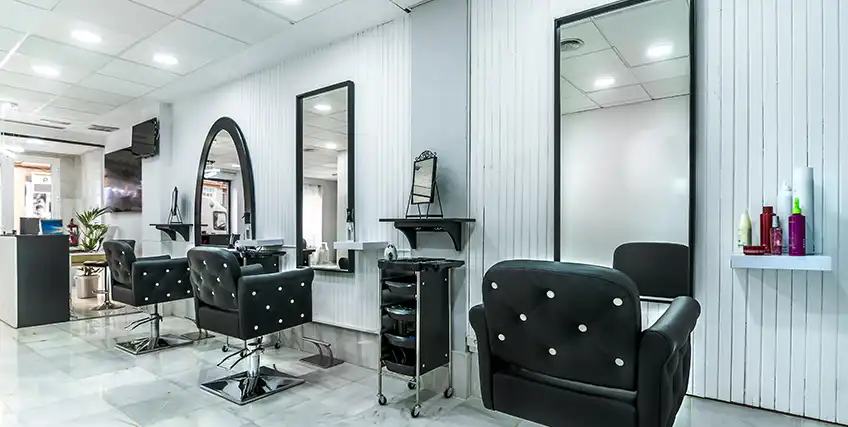Salon Financing: Start Your Business with the Right Financial Foundation
February 11, 2025 | Last Updated on: February 12, 2025

There are nearly a million beauty salons in the United States, offering a wide range of styles and salon services as well as catering to a variety of customer budgets.
Whether you’re starting a new business or buying an existing salon, you can expect some of the same costs to creep up. Here’s a look at how to open a beauty salon and turn your dreams into a profitable, long-term reality with the right financing options.
Understanding the Financial Needs of a Beauty Salon
Before you can successfully open a beauty salon, you should first know how much money it’ll take to break into — and then continue to make it — in the salon industry.
Starting your own business can involve significant startup costs, such as
- Renting or buying a salon location
- Build-out or renovation of the salon space
- Salon equipment (such as chairs for a barbershop, dryers for a hair salon, or manicure tables for a nail salon)
- Salon management tech and equipment (scheduling, salon software, website, point of sale (POS) machines, registers and card swipers, etc.)
- Salaries for staff (or initial expenses for stylists or providers who are independent contractors)
- Marketing expenses (signage to attract foot traffic, local advertisements to expand your client base, a social media manager to develop and implement a marketing strategy and bring in new clients, etc.)
Your successful salon will also have ongoing operational costs to consider, and planning for those upfront can help you develop your salon’s budget. These include lease agreement payments (which also have the potential to increase over time), utility bills, business insurance premiums, taxes, marketing, salaries, and even product inventory. Your costs will vary based on the exact type of business you own, your business structure, and the target market.
Lastly, a good entrepreneur should estimate how long it’ll take their own salon to reach profitability. This number will vary based on your initial investment costs, market research, and other factors, but just know that it can take many years to get out of debt after you open a beauty salon. However, your initial funding can help bridge that financial gap until your new salon becomes profitable.
Different Financing Options for Beauty Salons
There are a few different ways that business owners can finance a new salon in the beauty industry. The right small business loan for a beauty salon depends on how much you need to borrow, your credit and business history, and how quickly you need funding approval.
Traditional Bank Loans
Taking out a traditional bank loan or line of credit is a popular option for opening a beauty salon. These loans are available through many banks, credit unions, and online lenders, and may offer quick funds to qualified business owners.
Depending on the lender, you may be expected to provide statements, licenses, and reports as part of your salon business loan application process. These could include a business plan, financial projections, and a copy of your cosmetology and/or salon licenses. If you’re trying to open a beauty salon for the first time with no previous experience, your business credit score may not be enough to qualify, so you may also need to offer a personal guarantee to get approval.
Small Business Administration (SBA) Loans
Some loans are offered by traditional lenders but are backed by the Small Business Administration (SBA). This can make it easier to take out larger loans and even qualify for a lower interest rate in some cases but expect the application and approval process to be more involved.
SBA loans can take weeks or even months to get funding. To streamline the process, be sure to have documentation such as your business license, a copy of your employer identification number (EIN), a business plan, any market research you’ve done on your location or other local businesses, and more.
Alternative Lenders and Online Loans
Online and alternative lenders offer quick and accessible financing options. Whether you’re a new cosmetologist or a seasoned hair stylist, you can quickly fund and open a beauty salon with these online and small business lenders, sometimes without the need for extensive applications or ever leaving the house.
It’s important to note that one of the tradeoffs for these loans is that they usually have higher interest rates than more secured loans, such as SBA loans. They may also charge origination fees and other loan costs that will increase your overall pricing.
Personal Savings
If you have personal savings available, you can fund and open a beauty salon with this cash. This can be a great way to start your new business without the added cost of a loan or lengthy application process.
Using personal savings to fund a business also has risks, though. You may use up most or all of your liquidity and not have any emergency savings available for unexpected expenses. You’ll also need to be sure that you have enough cash to fully open your beauty salon and cover costs until you’re earning money, or you may still need to turn to a loan down the line.
Partnerships
It's not uncommon for entrepreneurs in the beauty industry to partner to open a beauty salon. Depending on the specifics of the salon and the exact industry you’re in, you might want to consider partnering with other cosmetologists, stylists, barbers, etc. to fund and start your new business.
The details of your partnership will vary based on how everyone plans to fund their portion, how ownership will be split, and how the business will be managed. It’s important to work with a high-quality financial advisor and even a business attorney to ensure all parties understand their roles, expectations, and obligations. (For example, if the partnership dissolves in the future, who gets to keep the salon’s name?)
Tips for Managing Your Beauty Salon’s Finances Effectively
When it comes to owning a beauty salon, opening your business is only the first step. It’s also important to keep clear financial records, maintain a strong budget, and evaluate your business regularly.
- Maintain a detailed financial record. Tracking your business’ progress and growth can help you understand your financial situation and even pivot your efforts. You might do this with great accounting software or even hire an accountant, who is essential for keeping track of expenses, revenues, and taxes. Not sure who to hire? Ask for a referral from other salon owners in your area.
- Keep personal and business finances separate. Maintaining separate personal and business bank accounts is imperative for any small business owner. At the very least, this will help you avoid confusion during tax season and to protect your personal assets.
- Monitor key performance indicators. Calculating and tracking specific financial metrics will keep you in the know regarding your profit margins, average costs per client, and your business’s overall return on investment (ROI).
- Plan for seasonal fluctuations. Most businesses experience seasonal fluctuations, but these don’t have to cripple you financially if you prepare ahead of time. Budget your cash flow for the slow seasons and capitalize on any busy periods in your industry to even things out all year long. You can even use business loans to get you through a slump if necessary.
- Build a reserve. Emergency funds are important for everyone, business owner or not. Setting aside cash for unexpected expenses or to cover slow months can keep your salon afloat and ease your financial stress, no matter what happens.
Final Thoughts
You’ve thought of a business name, started creating your salon checklist, and maybe even begun gathering potential client lists. Now, as a new business owner, it’s time to fund and open a beauty salon.
One key to your beauty salon business success will be creating a strong financial plan from the very beginning and choosing the financing options that are best for you, your personal and business credit history, your budget, and even your timeline. In some cases, you might even want to seek advice from a trusted financial professional to help you structure your new business (and your finances!) before your first clients ever sit in the chair.
FAQs about Opening a Beauty Salon
Do I need a cosmetology license to open a beauty salon?
Each state sets its own unique requirements for beauty salon businesses, so you’ll want to see what’s necessary before you ever start the process. You may need a cosmetology license, an operator license, and more to open your doors.
How do beauty salon owners make money?
Salon owners earn income from their clients, just like any other non-owner stylist. However, salon owners can also earn money from other stylists working in their salon, who might rent a chair monthly, pay the owner a percentage of their fees, or some other arrangement. If your salon also sells products or merchandise, you can make additional income off of these sales.
Can I open a beauty salon in my home?
If opening a standalone beauty salon is too large an investment, you may be able to open a salon in a space you already own: your home. Not all states allow for in-home beauty salons and of those that do, specific requirements must be met regarding the space, accessibility, licensing, and more. Be sure to check with your state to see what is required.
Can I take out a loan to open a beauty salon?
There are many traditional and non-traditional business loan options for salon owners, offered through banks, credit unions, online lenders, and more. You can also consider partnerships with other stylists, utilizing existing savings or lines of credit, and even tapping into credit cards for certain expenses.
How much does it cost to open a beauty salon?
Opening a beauty salon might cost anywhere from $60,000 to $130,000. Your cost to start a new salon business depends on whether you’re building from the ground up, renovating a space, or even buying an existing business. It also depends on whether you’ll hire stylists or just allow them to rent space from you, your state licensing requirements, and how much equipment, product, advertising, and other costs you have.
Frequent searches leading to this page




